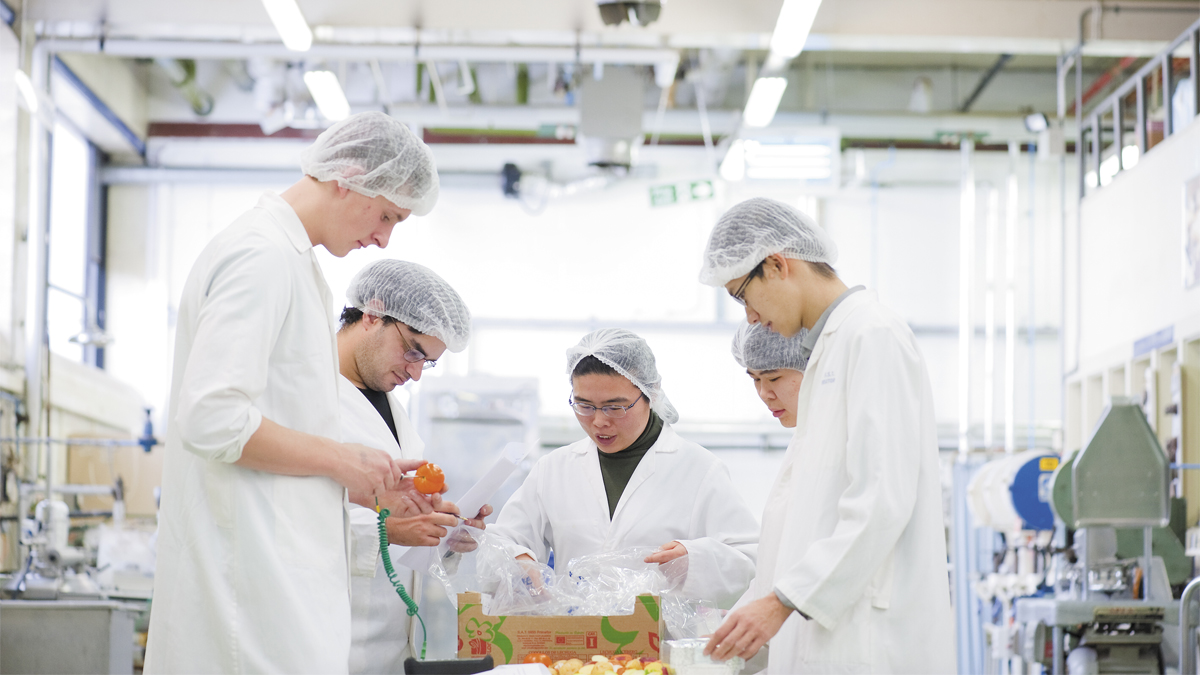A structured approach to learning
Our courses are structured to build knowledge and skills in interlinked themes over the duration of your studies. Starting with the underpinning fundamentals, you will be taken on a journey through the world of food and nutrition to graduate as an expert in this diverse subject. With typical contact time of 25 hours each week, you will have time to master the different aspects of food and nutritional sciences.
Core knowledge of food and nutritional sciences
Your first year at Reading will give you an impressive understanding of the principles, science, research and practical skills which will be invaluable through your degree and beyond. As a precursor to later industrial placements, you will embark on field trips into the food production sector. You will also be introduced to our pilot plant - an excellent chance to learn new skills with industry grade equipment.
"Everyone in the Department is so friendly – really approachable and friendly staff. Never feel alone, there's always help and support there if you need it. It's a great campus, lovely place to be, really lovely environment."
Hannah Pettit of Ella's Kitchen
Read Hannah's story
Skills for the food industry
The world of food and nutrition requires broad expertise that you will grow to understand, including: the principles of food microbiology and how these dictate the processes we use to ensure food safety; how the chemical and physical properties of different foods lead to their varied flavours, textures and colours; how nutrients impact on human physiology and how diet is linked to health and disease; how food processing operations are designed and new products developed.
Find out about our facilities
Developing your career direction
When you've completed your first year, you will have a much better idea of which subjects interest you and where you want to go. In the second year of both food and nutrition courses, you will have more opportunity to pursue the specialities of these subjects, whether that be in relation to business or scientific research.
"Students will do practicals like ice cream making, bread making, sausage production, spray drying of coffee, so usually by the end of it they've made a product that they can take away and eat. It really puts a bit of context in for them."
Dr Colette Fagan, Associate Professor
Read Colette's story
Experiencing the food industry
Our aim is that you will leave the University as a qualified expert in food and nutritional sciences. A big part of that is getting to know the industry. During your course you will have the option to complete a year long placement with the food industry if you want to. Not only does this mean that you get the chance to see everything you have learned into practice, it also means adding an extremely valuable year of industry experience to your CV.
"It was when I started working, doing the placements and seeing how food is made on an industrial scale, that it really struck a chord with me and really interested me, even more than I thought it would."
Ben Hills of Bighams
Learn more about placements
Becoming an expert
In your final year of academic study you will have the opportunity to make your personal mark in the world of food and nutritional sciences by completing your own project, which will either take the form of a literature based review or a practical research project. Working as part of a lab team alongside peers, PhD students and postdocs, you will come away with valuable experience of a scientific environment. In our New Product Development module, you will also have the opportunity to develop innovative food products using the same processes as industry. When you graduate at the end of the year, you will have all the skills and experience to begin a rewarding career.
"Working on the project at Reading has given me the confidence to know that I can develop a successful product, which can make it in the real world."
Pavandeep Matharu on the New Product Development module
Read Parvandeep's story

